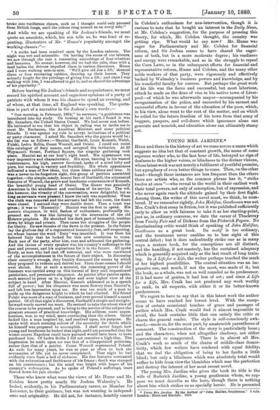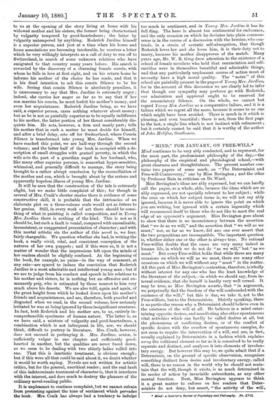YOUNG MRS. JARDLgE.*
HERE and there in the history of art we come across a name which suggests no idea but that of constant growth, the name of some supreme worker who, to the last hour of life, betrayed no sign of deafness to the higher voices, or blindness to the diviner visions, whose latest work was not merely a fulfilment of youthful promise, but a prophecy of even better things to come. Then, on the other handâthough these instances are less frequent than the others there are artists who, as the common phrase has it, "strike twelve at once "âwho reveal to the world in their earliest work their total powers, not only of conception, but of expression, and. who never again reach the altitude gained by their first flight. Among these, the writer of this novel must, we think, be num- bered. If we remember rightly, John Halifax, Gentleman was not Mrs. Craik's first essay in fiction, but it was published sufficiently early to allow us with fairness to take it as her starting-point, just as, in ordinary converse, we date the career of Thackeray from Vanity Fair and of Dickens from the Pickwick Papers. No discriminating critic would think of speaking of John Halifax, Gentleman as a great book. Its motif is too ordinary, and the treatment never enables us to lose sight of this central defect ; but it does undoubtedly strike one as in many ways a mature book, for the conceptions are all distinct, and the handling, if not masterly, has the sustained adequacy which is generally acquired only as the last result of long train- ing. In A Life for a Life, the writer perhaps touched the mark of her highest possibilities. The central situation was an im- pressive one, and much, if not the most, was made of it; but the book, as a whole, was not so well rounded as its predecessor. If it had more of genius, it had less of art ; and since A Li.fe for a Life, Mrs. Craik has not produced any work worthy to rank, in all respects, with either it or its better-known predecessors.
We regret to have to say that in this latest work the author seems to have reached her lowest level. With the excep- tion of certain occasional touches of grace and passages of pathos which Mrs. Craik would find it almost impossible to avoid, the book contains little that can satisfy the critic or charm the general reader. The style is self-consciously awk- ward,âmade so, for the most part, by amateurish parentheses of comment. The construction of the story is particularly loose ; and the characters, when not altogether shadowy, are either conventional or exaggerated. There is in almost all Mrs. Craik's work so much of the charm of middle-class domes- ticity, which few writers have rendered with equal fidelity, that we feel the obligation of being to her faults a little blind; but only a blindness which was absolutely total would suffice to hide from view the blemishes which mar the perfection and destroy the interest of her most recent novel.
The young Mrs. Jardine who gives the book its title is the wife of Roderick Jardine, a young gentleman whom, we sup- pose we must describe as the hero, though there is nothing about him which strikes us as specially heroic. He is presented.
⢠Young Mrs. Jardine. By the Author of" John Halifax, Oentleman." 8 vole. London: Hunt and Blaekett. 1878.
to us at the opening of the story living at home with his widowed mother and his sisters, the former being characterised by vulgarity tempered by good-heartedness ; the latter by vulgarity nntempered by anything. Roderick Jardine himself is a superior person, and just at a time when his home and home associations are becoming intolerable, he receives a letter which he very willingly interprets as a call of duty to run off to Switzerland, in search of some unknown relatives who have emigrated to that country many years before. His search is rewarded by the discovery of a charming female cousin, with whom he falls in love at first sight, and on his return home he informs his mother of the choice he has made, and that it is his fixed intention to ask this cousin Silence to be his wife. Seeing that cousin Silence is absolutely penniless, it is unnecessary to say that Mrs. Jardine is extremely angry ; indeed, she carries her anger so far as to say that if her son marries his cousin, he must forfeit his mother's money, and even her acquaintance. Roderick Jardine being, as we have said, a superior person, cares nothing whatever about money; but as he is not so painfully superior as to be equally indifferent to his mother, the latter portion of her threat considerably dis- quiets him. He acts, however, a firm and manly part; tells his mother that in such a matter he must decide for himself, and after a brief delay, sets off for Switzerland, where Cousin Silence is transformed into young Mrs. Jardine. When we have reached this point, we are half-way through the second volume; and the latter half of the book is occupied with a de- scription of small struggles with genteel poverty, in which the wife acts the part of a guardian angel to her husband, who, like many other superior persons, is somewhat hyper-sensitive, whimsical, and generally difficult to manage, the story being brought to a rather abrupt conclusion by the reconciliation of the mother and son, which is brought about by the serious and apparently hopeless illness of young Mrs. Jardine.
It will be seen that the construction of the tale is extremely slight, but we make little complaint of this; for though in several of Mrs. Craik's shorter stories there is evidence of some constructive skill, it is probable that the intricacies of an elaborate plot on a three-volume scale would act as fetters to her genius. Still, in every work of art there should be some- thing of what in painting is called composition, and in Young 31fr8. Jardine there is nothing of the kind. This is not as it should be, but such a fault is venial, compared with unrealisable, inconsistent, or exaggerated presentation of character; and with this mortal artistic sin the author of this novel is, we fear, fairly chargeable. We question whether she had, in writing the book, a really vivid, vital, and consistent conception of the natures of her own puppets ; and if this were so, it is not a matter of wonder that the impressions left upon the minds of her readers should be slightly confused. At the beginning of the book, for example, no painsâin the way of comment, at any rateâare spared to induce the conviction that Roderick Jardine is a most admirable and intellectual young man ; but if we are to judge from his conduct and speech in his relations to his mother and sisters, he is nothing but an offensive and un- mannerly prig, who is estimated by those nearest to him very much above his deserts. We are also told, again and again, of the great height from which he looked down upon his mother's Mends and acquaintances, and are, therefore, both puzzled and disgusted when we read, in the second volume, how seriously irritated he was at being ignored by these insignificant creatures. In fact, both Roderick and his mother are, to us, entirely in- comprehensible specimens of human nature. The latter is, as we have said, a mixture of vulgarity and good-heartedness, a combination which is not infrequent in life, nor, we should think, difficult to portray in literature. Mrs. Craik, however, does not succeed in portraying it. Mrs. Jardine, senior, is sufficiently vulgar in one chapter and sufficiently good- hearted in another, but the qualities are never fused down, so we seem to be dealing with two elderly ladies rolled into one. That this is inartistic treatment, is obvious enough; but if this were all that could be said about it, we doubt whether it would be worth saying. Novels are not written for artistic critics, but for the general, uncritical reader; and the real fault of this indeterminate treatment of character is, that it interferes with the interest, and does much to destroy the pleasure of the ordinary novel-reading public.
It is unpleasant to continue complaint, but we cannot refrain from protesting against the tone of sentiment which pervades the book. Mrs. Craik has always had a tendency to indulge
too much in sentiment, and in Young Mrs. Jardine it has its- full fling. The hero is almost too sentimental for endurance,. and the only occasion on which he deviates into plain common- sense is in the course of a discussion with the heroine, who con- tends, in a strain of ecstatic self-abnegation, that though Roderick loves her and she loves him, it is their duty not to marry, because his mother disapproves of the match. Many years ago, Mr. W. R. Greg drew attention to the existence of a school of female novelists who held that renunciation and self- sacrifice were in themselves beautiful and admirable things, and that any particularly unpleasant course of action must of necessity have a high moral quality. The " notes " of this school are painfully present in the pages of Young 3fre. Jardine, for in the account of this discussion we are clearly led to infer that though our sympathy may perforce go with Roderick,. our admiration and approval ought to be reserved for the renunciatory Silence. On the whole, we cannot but regard Young Mrs. Jardine as a comparative failure, and it is a failure which we regret all the more, because it seems to us one which might have been avoided. There is much in it which is pleasing, and even beautiful ; there is not, from the first page to the last, a single line which is not instinct with refinement but it certainly cannot be said. that it is worthy of the author of John Halifax, Gentleman.



































 Previous page
Previous page